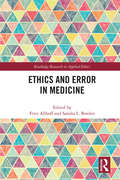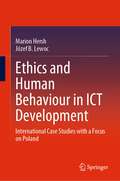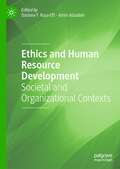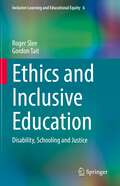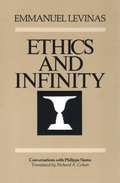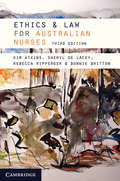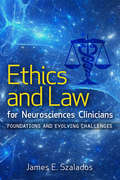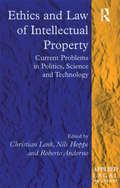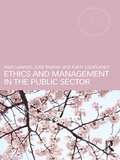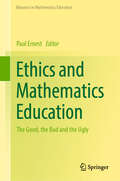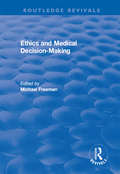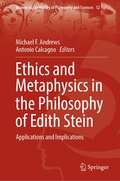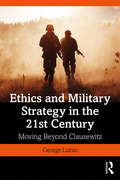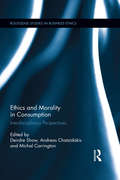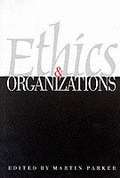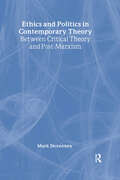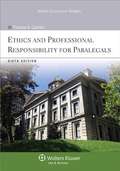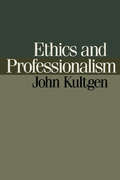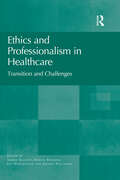- Table View
- List View
Ethics and Error in Medicine (Routledge Research in Applied Ethics)
by Fritz Allhoff Sandra L. BordenThis book is a collection of original, interdisciplinary essays on the topic of medical error. Given the complexities of understanding, preventing, and responding to medical error in ethically responsible ways, the scope of the book is fairly broad. The contributors include top scholars and practitioners working in bioethics, communication, law, medicine and philosophy. Their contributions examine preventable causes of medical error, disproportionate impacts of errors on vulnerable populations, disclosure and apology after discovering medical errors, and ethical issues arising in specific medical contexts, such as radiation oncology, psychopathy, and palliative care. They also offer practical recommendations for respecting autonomy, distributing burdens and benefits justly, and minimizing injury to patients and other stakeholders. Ethics and Error in Medicine will be of interest to a wide range of researchers, students, and practitioners in bioethics, philosophy, communication studies, law, and medicine who are interested in the ethics of medical error.
Ethics and Finance
by John HendryEthics and Finance: An Introduction provides a comprehensive and accessible introduction to the ethical issues raised by modern finance. Drawing carefully on ethical theory and with frequent use of case studies, it includes an analysis of the global financial system and its regulation and control, as well as a detailed analysis of the financial crisis. Chapters on specific areas of finance practice cover all the major financial scandals of recent times, from mis-selling to market manipulation and from insider trading to bankers' bonuses, as well as much more positive developments. From micro finance to derivatives trading, the book provides a careful and balanced treatment designed to help finance students and practitioners approach this sensitive topic in a thoughtful and constructive way. No prior knowledge of ethics or finance is required, and the book will be invaluable to students, finance teachers, practitioners and regulators.
Ethics and Human Behaviour in ICT Development: International Case Studies with a Focus on Poland
by Marion Hersh Józef B. LewocEthics and Human Behaviour in ICT Development discusses ethics in a professional context and encourages readers to self-assessment of their own behaviour. It provides thought-provoking accounts of the little-known early history of technological development in information and communication technology (ICT) and the automation industry in Poland, with a focus on Wroclaw. The book provides a framework for understanding the relationship between ethics and behaviour, and analyses critically ethical and behavioural issues in challenging workplaces and social contexts. It includes:case studies from around the world, especially Poland, which illustrate the relationships between human behaviour and ethics;biographies of successful Polish ICT and automation leading designers;analysis of case studies of human behaviour and ethics in challenging industrial development and other environments; andillustrative practical applications alongside the theory of human behaviour and ethics. The authors demonstrate the ingenuity of the early Polish designers, programmers and other specialists in overcoming the shortage of components caused by import embargoes to enable Poland to develop its own computer industry. An example of this is Elwro, formerly the largest manufacturer of computers in Poland. The discussion of its growth illustrates the potential of human creativity to overcome problems. The discussion of its fall highlights the importance of ethical approaches to technology transfer and the dangers of a colonialist mentality. The book is designed for engineers, computer scientists, researchers and professionals alike, as well as being of interest for those broadly concerned with ethics and human behaviour.
Ethics and Human Resource Development: Societal and Organizational Contexts
by Darlene F. Russ-Eft Amin AlizadehThis book adds to the debate around HRD and ethical dimensions in the workplace, evaluating the micro and macro environments and their role in designing a moral organizational culture. It assesses contemporary issues such as CSR and DEI and culture and their impact on the organization and employees. Examining the definition, purpose, and scope of ethics applied in HRD, this book will offer readers an in-depth understanding of current and future ethical challenges in the workplace and in society. It will provide theoretical and practical knowledge for creating and sustaining ethical climates in organizations.
Ethics and Inclusive Education: Disability, Schooling and Justice (Inclusive Learning and Educational Equity #6)
by Gordon Tait Roger SleeThis book reveals the entanglement of ethics, rights and justice in education. It aims to develop everyday philosophy to guide choices as we continue to attempt to make schools places for all comers. The authors offer education as a social good, a building block for inclusive communities. This assumes an ethical predisposition. Ethics and inclusive education takes the reader on a journey through the conceptual foundations of ethics, rights and justice to assist us to build a formulation of the fair or just society and the way ethical approaches to schooling may support or unravel that.
Ethics and Infinity
by Emmanuel LevinasLevinas brings together the phenomenology of Husserl, the fundamental ontology of Heidegger, and the Bible. This book highlights his modesty and reserve and, above all, his rigor. It is the best introduction to his work. Chapters Include: Bible and Philosophy; Heidegger; The 'There Is'; The Solitude of Being; Love and Filiation; Secrecy and Freedom; Responsibility for the Other; The Glory of Testimony; The Hardness of Philosophy and the Consolations of Religion. Translated from the French by Richard Cohen.
Ethics and Integrity in British Politics
by Nicholas Allen Sarah BirchPublic perceptions of political ethics are at the heart of current political debate. Drawing on original data, this book is the first general account of popular understandings of political ethics in contemporary British politics. It offers new insights into how citizens understand political ethics and integrity and how they form judgments of their leaders. By locating these insights against the backdrop of contemporary British political ethics, the book shows how current institutional preoccupations with standards of conduct all too often miss the mark. While the use of official resources is the primary focus of much regulation, politicians' consistency, frankness and sincerity, which citizens tend to see in terms of right and wrong, are treated as 'normal politics'. The authors suggest that new approaches may need to be adopted if public confidence in politicians' integrity is to be restored.
Ethics and Law
by W. Bradley WendelThis casebook provides an overview of the wide range of legal and ethical issues facing lawyers in practice. As did prior editions, the Fifth Edition integrates discussion of the ABA's Model Rules, the ALI's Restatement of the Law Governing Lawyers, as well as case law, statutory law, and regulatory law governing lawyers. Many sections of the book are expanded and updated, including discovery abuse, ethics in electronic discovery, advertising and the Internet, simultaneous representation of corporations and officers, prosecutorial misconduct, and legal advising by government lawyers.
Ethics and Law for Australian Nurses
by Kim Atkins Bonnie Britton De Lacey Sheryl Rebecca RippergerThe third edition of Ethics and Law for Australian Nurses develops an innovative practical framework for understanding the ethical and legal dimensions of nursing practice in Australia. Taking a 'relational' approach to practice, the text foregrounds the concepts of personhood, vulnerability and the nurse-patient relationship as the source of a nurse's moral and legal obligations. This approach is central to the book's discussion of key ethical and legal concepts throughout the text including consent and autonomy, negligence and liability, confidentiality and trust, and culturally safe practice. This edition has been thoroughly revised to include the latest research and methods, updated legislation and links to professional documentation, along with a new chapter on aged care. Student learning is supported by case studies, legal case extracts and learning exercises. A new instructor companion website features a curated suite of multimedia resources and extension questions.
Ethics and Law for Neurosciences Clinicians: Foundations and Evolving Challenges (Clinical Neurology Best Practices)
by James E SzaladosThe brain represents the final frontier in medical sciences. Clinical neurosciences include the subspecialties of neurology, neurosurgery, neuro-imaging, cerebrovascular interventional specialties, neurocritical care, and the allied specialties in pharmacy and nursing. The first lens through which we see our patients is the clinical perspective; however, the complexity of neurosciences and the rapidity of the advances in these subspecialties require that clinicians not lose sight of the personhood of the patients, the professionalism required in the care of these complex patients, or the regulatory environment in which we practice. Science and technology are advancing more rapidly than regulations or the law can interpret and integrate them into a supportive or regulatory framework. Thus, morality, ethics, and the law comprise the final lens through which we approach complex patient management issues, frame our communications with patients and families, and evaluate the risks and potential benefits of new technology. Ethics and Law for Neurosciences Clinicians is written for all clinicians in the neurosciences specialties to examine and re-examine the ethical and legal implications of advances in clinical neurosciences.
Ethics and Law of Intellectual Property: Current Problems in Politics, Science and Technology (Applied Legal Philosophy)
by Nils Hoppe Christian LenkDivided into three parts, this edited volume gives an overview of current topics in law and ethics in relation to intellectual property. It addresses practical issues encountered in everyday situations in politics, research and innovation, as well as some of the underlying theoretical concepts. In addition, it provides an insight into the process of international policy-making, showing the current problems in the area of intellectual property in science and research. It also highlights changes in the fundamental understanding of common and private property and the possible implications and challenges for society and politics.
Ethics and Management in the Public Sector (Masters in Public Management)
by Alan Lawton Julie Rayner Karin LasthuizenGrappling with ethical issues is a daily challenge for those working in organizations that deliver public services. Such services are delivered through an often bewildering range of agencies and amidst this constant change, there are fears that a public service ethos, a tradition of working in the public interest, becomes blurred. Using extensive vignettes and case studies, Ethics and Management in the Public Sector illuminates the practical decisions made by public officials. The book takes a universal approach to ethics reflecting the world-wide impact of public service reforms and also includes discussions on how these reforms impact traditional vales and principles of public services. This easy-to-use textbook is a definitive guide for postgraduate students of public sector ethics, as well as students of public management and administration more generally.
Ethics and Mathematics Education: The Good, the Bad and the Ugly (Advances in Mathematics Education)
by Paul ErnestThis edited volume is an inquiry into the ethics of mathematics education, and to a lesser extent, the ethics of mathematics. The imposition of mathematics for all raises questions of ethics. What are the ethics of teaching school mathematics? What are the costs as well as the benefits? What are the ethical issues raised by the official aims of mathematics teaching, the planned curriculum, the pedagogies employed in school and college mathematics and the assessment systems? These questions are addressed in the book as well as what systems of ethics we might use. The volume ventures into a burgeoning new field. It offers a unique set of investigations, both theoretical and in terms of practices. It announces the ethics of mathematics education as a new subfield of research and includes valuable contributions from many of the best-known researchers in mathematics education; additionally, it is a valuable resource for students, teachers and researchers in the field. This is an enduring and classic source book in the field. From the wisdom of leading scholars to the little heard voices of students, this collection offers the reader many striking new insights into the ethics of mathematics and education.
Ethics and Medical Decision-Making (Routledge Revivals)
by Michael D. FreemanThis title was first published in 2001: Ethical thinking about medical decision-making has roots deep in history. This collection of contemporary essays by leading international scholars traces the development of modern bioethics and explores the theory and current issues surrounding this widely contested field.
Ethics and Metaphysics in the Philosophy of Edith Stein: Applications and Implications (Women in the History of Philosophy and Sciences #12)
by Antonio Calcagno Michael F. AndrewsThis book is dedicated to Edith Stein (1891–1942), who is known widely for her contributions to metaphysics. Though she never produced a dedicated work on questions of ethics, her corpus is replete with pertinent reflections. This book is the first major scholarly volume dedicated to exploring Stein’s ethical thought, not only for its wide-ranging content, from her earlier to later works, but also for its applications to such fields as psychology, theology, education, politics, law, and culture. Leading international scholars come together to provide a systematic account of Stein’s ethics, highlighting its relation to Stein’s highly developed and complex metaphysics. Questions about the good, evil, the rights and ethical comportment of the person, the state, and feminism are addressed. The book appeals to scholars interested in the history of philosophical and ethical thought
Ethics and Military Strategy in the 21st Century: Moving Beyond Clausewitz (War, Conflict and Ethics)
by George R. Lucas, Jr.This book examines the importance of "military ethics" in the formulation and conduct of contemporary military strategy. Clausewitz’s original analysis of war relegated ethics to the side-lines in favor of political realism, interpreting the proper use of military power solely to further the political goals of the state, whatever those may be. This book demonstrates how such single-minded focus no longer suffices to secure the interest of states, for whom the nature of warfare has evolved to favor strategies that hold combatants themselves to the highest moral and professional standards in their conduct of hostilities. Waging war has thus been transformed in a manner that moves beyond Clausewitz’s original conception, rendering political success wholly dependent upon the cultivation and exercise of discerning moral judgment by strategists and combatants in the field. This book utilizes a number of perspectives and case studies to demonstrate how ethics now plays a central role in strategy in modern armed conflict. This book will be of much interest to students of just war, ethics, military strategy, and international relations.
Ethics and Morality in Consumption: Interdisciplinary Perspectives (Routledge Studies in Business Ethics #8)
by Deirdre Shaw Andreas Chatzidakis Michal CarringtonEthical consumerism is on the rise. No longer bound to the counter-cultural fringes, ethical concerns and practices are reaching into the mainstream of society and being adopted by everyday consumers – from considering carbon miles to purchasing free-range eggs to making renewable energy choices. The wide reach and magnitude of ethical issues in society across individual and collective consumption has given rise to a series of important questions that are inspiring scholars from a range of disciplinary areas. These differing disciplinary lenses, however, tend to be contained in separate streams of research literature that are developing in parallel and in relative isolation. Ethics in Morality and Consumption takes an interdisciplinary perspective to provide multiple vantage points in creating a more holistic and integrated view of ethics in consumption. In this sense, interdisciplinary presupposes the consideration of multiple and distinct disciplines, which in this book are considered in delineated chapters. In addition, the Editors make an editorial contribution in the final chapter of the book by combining these separate disciplinary perspectives to develop a nascent interdisciplinary perspective that integrates these perspectives and presents platforms for further research.
Ethics and Organizations
by Martin ParkerA compilation of academic articles on the connections between ethics and businesses, as well as other organizations.
Ethics and Pandemics: Interdisciplinary Perspectives on COVID-19 and Future Pandemics (Springer Series in Public Health and Health Policy Ethics)
by Andrew SolaThis book is for readers who wish to understand the ethical implications of the COVID-19 pandemic — holistically — on communities, politics, the economy, the environment, international relations, public health, and, most importantly, on their own lives and their own futures. It also helps readers to think through the wide-ranging ethical implications of the new age of global pandemics. The COVID-19 pandemic has transformed all of our lives to such an extent that no single publication will ever be able to capture its complexity. The book acknowledges this complexity by embracing interdisciplinary dialogue. It is open to diverse points of view, different ethical systems, and a wide variety of academic disciplines. It suggests three broad avenues to exploring the subject: Ethics for Pandemics: What ethical theories are useful for pandemic living?Ethics in Pandemics: How are long-standing ethical dilemmas revealed in pandemics? Ethics of Pandemics: How should politicians and public health professionals create ethical systems of pandemic management? Interdisciplinary perspectives are another key feature of the book and reflect the important insights that many academic disciplines — medical ethics and public health, history, political science, economics, behavioral and evolutionary psychology, and climate science — bring to bear on the subject. In the chapters, the author joins theory and practice, providing an overview of the major ethical theories: Kant and DeontologyUtilitarianism and Consequentialist EthicsSocial Contract TheoryEgoism and AltruismVirtue Ethics It then uses these theories to analyze both COVID-19 and also historical pandemics, including typhus, smallpox, the Black Death, HIV/AIDS, and polio. Ethics and Pandemics: Interdisciplinary Perspectives on COVID-19 and Future Pandemics prepares readers to better understand ethical living during times of crisis. While written for students pursuing any discipline, it is particularly suited for those seeking degrees in public health, health care, political science, and philosophy. Furthermore, non-specialized readers and members of the general public will find the book of interest.
Ethics and Philosophical Critique in William James
by Sarin MarchettiMarchetti offers a revisionist account of James's contribution to moral thought in the light of his pragmatic conception of philosophical activity. He sketches a composite picture of a Jamesian approach to ethics revolving around the key notion and practice of a therapeutic critique of one's ordinary moral convictions and style of moral reasoning.
Ethics and Philosophical Critique in William James
by Sarin MarchettiMarchetti offers a revisionist account of James's contribution to moral thought in the light of his pragmatic conception of philosophical activity. He sketches a composite picture of a Jamesian approach to ethics revolving around the key notion and practice of a therapeutic critique of one's ordinary moral convictions and style of moral reasoning.
Ethics and Politics in Contemporary Theory Between Critical Theory and Post-Marxism (Routledge Innovations in Political Theory #Vol. 4)
by Mark DevenneyIn addressing the political and theoretical debates between critical and post-Marxist theorists, this book discusses the politics of communication and rationality, subjectivity, sovereignty, ethics and deliberative democracy, considering questions such as:* Does the theory of communicative action justify deliberative democracy?* Is a theory of hegemony compatible with an account which relies upon an ideal of communicative success?* Is autonomy a good which should be fostered?* Can the ideal of democracy extend beyond the nation state?* Does post-Marxism have anything interesting to say about ethics?Analysing the work of Ernesto Laclau and Jürgen Habermas - as representatives of different choices made in regard to theory, politics and morality - Ethics and Politics in Contemporary Theory develops a critical response to the contrasting conclusions of these approaches.
Ethics and Professional Responsibility for Paralegals (Sixth Edition)
by Therese A. CannonThis book is written for paralegal students and working paralegals, and for lawyers who use the services of paralegals. It is intended for use primarily as a text but is also used by those in practice as a reference manual.
Ethics and Professionalism
by John KultgenJohn Kultgen explores the ways morality and professional ideals are connected. In assessing the moral impact of professionalism in our society, he examines both the structure and organization of occupations and the ideals and ideology associated with professions.Differing from standard treatments of professional ethics, Ethics and Professionalism recognizes that it is the practices within the professions that determine whether rules and ideals are used as masks for self-interest or for genuinely moral purposes.
Ethics and Professionalism in Healthcare: Transition and Challenges
by Sabine Salloch, Verena Sandow, Jan Schildmann, Jochen VollmannRecent social developments, such as demographic change, skill shortages and new medical technologies, have necessitated a transition in the traditional roles of health-care professions. New forms of division of labour and inter-professional health-care education are emerging while at the same time ethical challenges, such as corruption and conflicts of interest, have to be mastered. This book addresses historical, conceptual and empirical aspects of professionalism and inter-professionalism in health care from an international and interdisciplinary perspective. The work is divided into five sections: historical and societal aspects of health care professions; learning and teaching medical professionalism; transformation of health care professions; professional leadership and team decision-making in health care; and ethical challenges to health care professionalism. The final chapter integrates the main ideas and perspectives on health-care professionalism which have been developed throughout the book and highlights how the work in the diverse disciplines is interrelated. The book will be a valuable reference for the many researchers and students with an interest in medical ethics, professionalism and comparative systems of healthcare.
